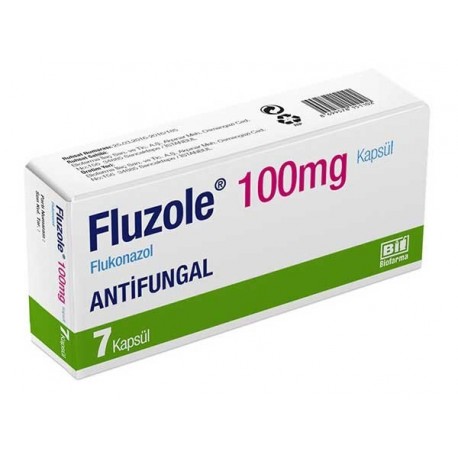 View larger
View larger Fluzole (Diflucan fluconazole) 7 Capsules
New product
BUY MORE PAY LESS
| Quantity | Discount | |
|---|---|---|
| 2 | 5% | |
| 3 | 10% | |
| 4 | 15% | |
| 5 | 20% |
Volume discounts
| Quantity | Discount | You Save |
|---|---|---|
| 2 | 5% | Up to $3.40 |
| 3 | 10% | Up to $10.20 |
| 4 | 15% | Up to $20.40 |
| 5 | 20% | Up to $34.00 |
More info
FLUZOLE 100 mg capsules are taken orally.
Active ingredient
Each capsule contains 100 mg of fluconazole.
Excipients
Lactose, starch, aerosil, magnesium stearate, sodium lauryl sulfate
2.What is FLUZOLE and what is it used for?
FLUZOLE is a white homogeneous powder in number 2 white capsule.
FLUZOLE is one of a group of medicines called antifungals. The active ingredient is fluconazole.
FLUZOLE is used to treat infections caused by fungi, including yeasts. It can also be used to prevent you from getting a fungal infection. The most common cause of fungal infections is a yeast called Candida.
This medicine may be given to you by your doctor to treat the following types of fungal infections.
Mucosal thrush, infection of the mouth or throat. Patients with normal or compromised immune functions can be treated.
Skin infections - eg. Foot fungus, ringworm, itching.
Internal (systemic) fungal infections caused by:
Blood circulation, body organs (e.g. heart, lungs), peritoneum, membrane consisting of a row of squamous epithelial tissue covering the inside of the heart, candida found in the eye or urinary tract
• Cryptococcus, eg. infections in other areas, such as meningitis and the lungs and skin
In immunocompetent patients, in developing systemic fungal diseases
You may also be given FLUZOLE for the following:
To prevent you from getting a yeast infection (if your immune system is not working properly). In the prevention of fungal infections in patients who predispose to fungal infections due to malignant disease as a result of drug therapy in cell-killing cancer or radiation therapy in cancer.
• To prevent the return of an infection from Cryptococcus (in AIDS patients)
Your doctor may begin your treatment before the results of culture and other laboratory studies are known. Once the results are clear, treatment will be arranged by your doctor as needed.
3. How to use FLUZOLE?
The daily dose of fluconazole should depend on the type and severity of the fungal infection. For types of infections that require treatment with repeated doses, treatment should be continued until clinical parameters or laboratory tests indicate that the active fungal infection has cleared. An insufficient duration of treatment leads to a relapse of the active infection. To prevent recurrence; AIDS and cryptococcal meningitis require maintenance therapy.
Unless recommended otherwise by the doctor, the following doses may be used:
Mucosal thrush - dose depends on the site of infection
50 mg once daily for 7-14 or 14-30 days. Doses are sometimes increased to 100 mg.
Fungal skin infections
50 mg once daily for 2-4 weeks (for athlete's foot, can be given for up to 6 weeks)
Systemic fungal infections
400 mg on day one, then 200-400 mg once daily for 6-8 weeks or longer if needed. If you have AIDS, your doctor may use the drug at 200 mg daily indefinitely after a full primary cure to prevent recurrence.
To prevent you from getting a fungal infection
When you are at risk of getting an infection, 50-400mg once a day. If you are at high risk of systemic infection, it is 400 mg once a day. Fluconazole administration should begin a few days before onset in patients with a predicted decrease in the number of granular cells in the blood (neutropenia) and continue for 7 days after the neutrophil count rises above 1000/mm3.
4. What are the possible side effects?
Like all medicines, there may be side effects in people who are sensitive to the substances contained in FLUZOLE.
Although serious allergic reactions are rare, a few people experience an allergic reaction. If you experience any of the following symptoms, tell your doctor immediately:
Sudden wheezing, difficulty breathing or chest tightness
swelling of the eyelids, face or lips
Itching, redness of the skin, or itchy red patches all over the body
skin rash
Severe skin reactions such as a rash that causes blistering (may also affect the mouth and tongue).
If you have AIDS, you are more likely to have severe skin reactions to medicines, including FLUZOLE.
Side effects are listed as shown in the following categories.
Very common Common
Uncommon Rare
Very rare Unknown
It can be seen in at least 1 of 10 patients.
It can be seen less than once in 10 patients, but more than once in 100 patients. It may occur less than once in 100 patients, but more than once in 1000 patients.
It may occur less than once in 1,000 patients.
It may occur less than once in 10,000 patients.
It cannot be estimated from the available data.
Widespread
Headache
Stomach ache
Nausea
Vomiting
stomach discomfort
Diarrhea
Gas
Debris
High alkaline phosphatase levels
Increase in aspartate aminotransferase
Increase in blood alkaline phosphatase
Unusual
Insomnia
sleepiness
seizures
Dizziness
Numbness
taste disorder
Dizziness due to balance disorder (vertigo)
indigestion, digestive disorder
Gas and dry mouth
slowing or stopping of bile flow
Jaundice

